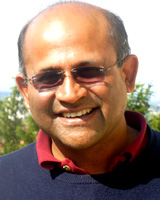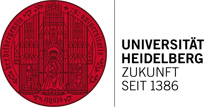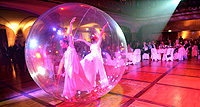“I found the interactions with the students very valuable”

Prof. Dr. Raju Venugopalan, Physicist at the Brookhaven National Laboratory in Brookhaven/USA and Adjunct Professor at Stony Brook University in New York/USA
currently Guest Professorship at the Institute for Theoretical Physics
When did you arrive in Heidelberg? How long do you plan to stay? What are your goals for your time in Heidelberg?
I arrived in Heidelberg at the end of August 2015 and will stay a whole year until August 2016. My goal here is to interact closely with my Heidelberg colleagues at the Institute for Theoretical Physics and in the Physics Department to potentially pursue new research directions with them.
Why did you decide in favour of the Ruperto Carola?
I had collaborated closely with Prof. Dr. Jürgen Berges previously, having written 5 research papers with him and his students. I enjoyed this collaboration enormously. Also, I have been visiting Heidelberg periodically since the mid-90s and enjoyed the open and interactive atmosphere amongst the physics groups here. On a personal level, I found the quality of life here to be very high, which is an important consideration for a year long stay.
What have you learned so far in Heidelberg? What experiences have been particularly valuable?
Research in theoretical physics has a continuity that is not altered immediately by geography so I have focused in the first few months on finishing projects with colleagues back in New York and elsewhere. I lectured at the Heidelberg Physics Graduate Days (http://gsfp.physi.uni-heidelberg.de/graddays/) in October, giving 3 hours of lectures each day for 5 days straight – essentially a half-semester course. I found the interactions with the students very valuable and it gave me the idea to turn some of the lecture material into a book. In addition to physics conversations with my theory colleagues, I have also been interacting with my experimental colleagues in the Physics Institute in Neuenheimer Feld-specifically, members of the ALICE and LHCb collaborations that work at the Large Hadron Collider (LHC) at CERN in Geneva – trying to make sense of some of the data that they have been taking. An experience I found extremely rewarding was being able to attend the Falling Walls Conference (http://www.falling-walls.com/conference) in Berlin and listen to fascinating talks covering activities that push boundaries in all areas of civilization, not just science.
What do you like best about being in Heidelberg? What suggestions would you have for improvements?
I am here with my wife and eight year old daughter and we love the cosy atmosphere. Unlike in the United States, we don't own a car here and don't miss it at all. I enjoy walking every morning to Philosophenweg from our home in Handschusheim and back – I find that very conducive to creative thinking! Also, Heidelberg is very centrally located, which makes it very convenient for both personal and professional visits around Europe.
What is your view of the German scientific system in comparison to that of your home country or to that of other countries where you may have conducted research?
The german scientific system is outstanding. Science is valued by the general public – and that shows in the level of support my colleagues here enjoy. There are some differences, with pros and cons, between how research is conducted in the US. For instance, in my field, there are fewer PI's (or Professors) here typically but with larger groups of Ph.D students and post-doctoral fellows. In the US, there are more PI's but with smaller groups.
In your opinion, what is the importance of international exchanges for researchers?
Its absolutely vital. I am currently working and exchanging ideas on a daily basis with colleagues all over the world. Science has a universal language that transcends all manner of boundaries. Electronic communication can however only go so far – there is no substitute for a face-to-face exchange of ideas.
What is your opinion of the opportunities made available through the Research Alumni Network? Have you taken advantage of any of these opportunities yet? If yes, please elaborate.
Thus far the only activity I participated in has been the Falling Walls Conference – but I have only been here for 3 months. This conference was a fantastic experience; in addition to the actual talks, the atmosphere was relaxed and extremely conducive to people from vastly different fields talking to each other. In my field of physics, I enjoyed talking briefly with the Nobelists Wolfgang Ketterle and Brian Schmidt, both of whom gave outstanding presentations of their work. I was initially skeptical that such a conference could have an impact but my attendance changed that perception. Much of the impact of such events is subliminal – the net effect though was I came back energized from talking with such a wide array of people. One direct impact is that it made me think about how to present my research to a wide audience in the most effective way possible.

